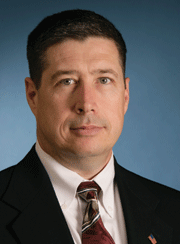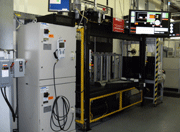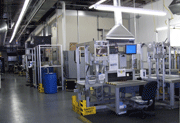E-Archive
Interview
in Vol. 12 - July Issue - Year 2011
Technological Advances for A High-Tech Company

Mark O

Cell 3 parts handler

Production Facility
LSP Technologies, Inc. was founded to commercialize new and innovative laser systems and processes. They have been a pioneer in its field. MFN talked to Mark O’Loughlin, the CTO of the company.
(?) MFN: One of LSP Technologies’ guiding principles is "To commercialize innovative high-energy laser technologies," - can you tell us what that means?
(!) M. O.: The Company’s emphasis has been on commercializing the materials-processing technology known as laser peening, which has been branded by LSP Technologies as our LaserPeenTM processing and equipment. Laser peening technology remains the Company’s primary technology emphasis while we continue to develop new technologies to reduce the process cost and increase the process throughput, such as with our RapidCoater™ system.
(?) MFN: What is the LaserPeenTM process?
(!) M. O.: LaserPeenTM processing uses LSP Technologies’ patented methods and equipment to laser peen metallic components. It is an advanced surface-enhancement process that significantly improves the fatigue resistance of components to surface-initiated failures resulting from, for example, foreign object damage, fretting, and stress corrosion cracking.
(?) MFN: Describe how the LaserPeenTM processing works.
(!) M. O.: LaserPeenTM processing drives a high amplitude shock wave into a material surface that is initiated with a high energy pulsed laser. The effect on the material being processed is achieved through the mechanical "cold working" effect produced by the shock wave, not a thermal effect from heating of the surface by the laser beam. The surface of the metal part is not heated by the process. Essentially, the part is "micro forged", spot by spot in critical areas.
During processing, an opaque overlay (a "black paint") and a water overlay are applied to the surface to be processed with our automated RapidCoaterTM process. The laser pulse passes through the transparent overlay and strikes the opaque overlay causing it to partially vaporize. The vapor absorbs the remaining laser light and produces a rapidly expanding plasma plume. The expanding plasma is confined between the surface of the part and the water overlay, and a rapidly rising high-pressure shock wave propagates into the component. When the peak stress of the shock wave is above the dynamic yield stress of the metal, the metal yields, and the metal is "cold worked" or plastically deformed at the surface.
The plastic deformation caused by the shock wave results in compressive residual stresses in the surface of the part. The depth and magnitude of the residual stresses depend upon the material and the processing parameters. Compressive residual stresses typically extend as deep as 0.040" to 0.100" (1.0 to 1.5 mm) below the surface and can approach the yield strength of the material at the surface of the part. These deep residual compressive stresses increase the resistance of materials to surface-related failures such as fatigue, fretting fatigue, and stress corrosion cracking by as much as a factor of 5 times.
(?) MFN: How is laser peening used?
(!) M. O.: Laser peening can be used in conjunction with shot peening to provide deeper compressive residual stress in fatigue critical locations. It is well suited for precisely controlled treatment of localized problem areas, whereas shot peening may be better suited for broad area coverage. Laser peening and shot peening may often be used in combination beneficially and economically to treat parts requiring deep compressive residual stress in critical areas and having less stringent requirements in other areas.
(?) MFN: What is LSP Technologies doing today with the process and technology?
(!) M. O.: Our primary focus is on providing laser peening as a production service. However, we continue to pioneer both the laser and process technology. For example, to increase process throughput, reduce process labor and variability, we developed our RapidCoaterTM system which automates the application of the processing overlays in concert with the laser system. We are also developing and implementing other process control technology aimed at further increasing throughput and reducing costs.
(?) MFN: What steps has LSP Technologies taken to maintain leadership in the industry?
(!) M. O.: We recently entered into a patent cross-license agreement with General Electric. As a result of the cross-license, LSP Technologies became the sole production-based licensee of GE’s entire laser peening patent portfolio, which includes more than 50 U.S. and foreign issued patents and numerous pending patent applications. LSP Technologies also became the sole production-based licensee of the coveted "GEN 4" laser peening technology, a relatively low power, high throughput laser peening technology that will revolutionize the laser peening industry.
(?) MFN: Can you give us some examples of industries that are using your process?
(!) M. O.: Laser peening provides significant fatigue resistance benefit to components, like fan and compressor blades for the turbine engine industry, dies for the forging industry and joint or other implants for the medical industry. We are production processing components in the US Air Forces F22 Raptor, land-based electrical power generation equipment and in metal forming dies to name a few.
(?) MFN: What types of engineering and manufacturing does LSP Technologies provide?
(!) M. O.: We supply an upfront materials engineering that allows our customers and us to jointly develop the specific requirements for laser peening our customers’ components. We also provide post-processing engineering along with the laser peening process itself; we are conducting our own coupon fatigue tests to provide further developments and validation of the process. In addition to designing and building our own high energy lasers, we do provide laser peening systems to our customers that wish to implement laser peening in their facilities for their own products.
(?) MFN: LSP Technologies is now delivering internationally, to handle this growth, are there any other technology areas to which you’re responding?
(!) M. O.: Our laser peening demand has more than tripled in the past 3 years so we’ve also developed an automated data analysis and review capability that speeds up our throughput and turnaround times and reduces process deviations. We have state of the art RFID parts tracking capability to further ensure the accurate flow of the part through all the process steps. We’re also improving our laser control systems while we’re bringing a new work cell on line this year.
(?) MFN: How does LSP Technologies distinguish itself from its competitors?
(!) M. O.: We provide engineering to support process and material concerns as an advocate for our customers, as well as provide an open exchange of information between our customers and us, to create a "share to learn" environment. Our goal is to achieve a collaborative relationship with our customers that benefits both parties; one that is more than customer/supplier, but rather technology partners. We work diligently to satisfy our customer’s needs in a way that makes us transparent in their engineering and manufacturing operations. We are currently providing laser peening services to domestic and international customers.
(?) MFN: At what stage in the manufacturing operation is laser peening applied?
(!) M. O.: Laser peening can be applied to new parts or to fielded parts to improve fatigue life. It can be used to satisfy new design requirements that may not be achievable without it and offers more flexibility for new parts because there are more options in the manufacturing sequence to begin to apply the process. It can be applied on a new part to a nearly finished surface or finished surface as some material removal will not greatly reduce the benefit of the process. For fielded parts that are refurbished and then LaserPeenTM processed, laser peening can be applied only to the finished surface as generally there is insufficient material to allow for subsequent machining of the surface.
(?) MFN: What is LSP Technologies doing to maintain its competitive lead?
(!) M. O.: In addition to the technologies mentioned before, we work with fully automated computer-controlled work-cells that are equipped with six axis robots, which allow us full articulation of any part for presentation to the laser beam for laser peening. One element of that automation is our RapidCoaterTM overlays application system which reduces or eliminates the parts handling requirements associated with other overlays by automatically applying both the opaque and transparent process overlays. It also increases our process throughput. This overlay system additionally benefits the process by reducing the waste levels associated with other overlays as it is a recoverable and recyclable media. We are the only company that uses this patented process.
Finally, LSP Technologies continues to innovate. We have received numerous patents since we’ve been in business regarding lasers and the laser peening process. With our recent patent cross-license agreement with General Electric, we continue to forge the future for our industry.
(?) MFN: How does the future look for LSP Technologies?
(!) M. O.: We foresee continued growth with our current laser peening customers and growth in the industry in general because laser peening technology is becoming more widely utilized. These growth areas will be in medical implants, ground transportation and material processing equipment where metal fatigue also occurs. To reach these other markets and broaden our current markets, we continue to conduct research in laser technology and processes to improve quality and increase throughput, and in the application of lasers for improving the reliability and capability of various components.
We would like to thank Mark O’Loughlin for this interview!
For information:
LSP Technologies, Inc.
6145 Scherers Place
Dublin Ohio 45016, USA
Tel. +1.614.718.3000
Fax +1.614.718.3007
E-mail: dlahrman@lspt.com
www.lspt.com



























